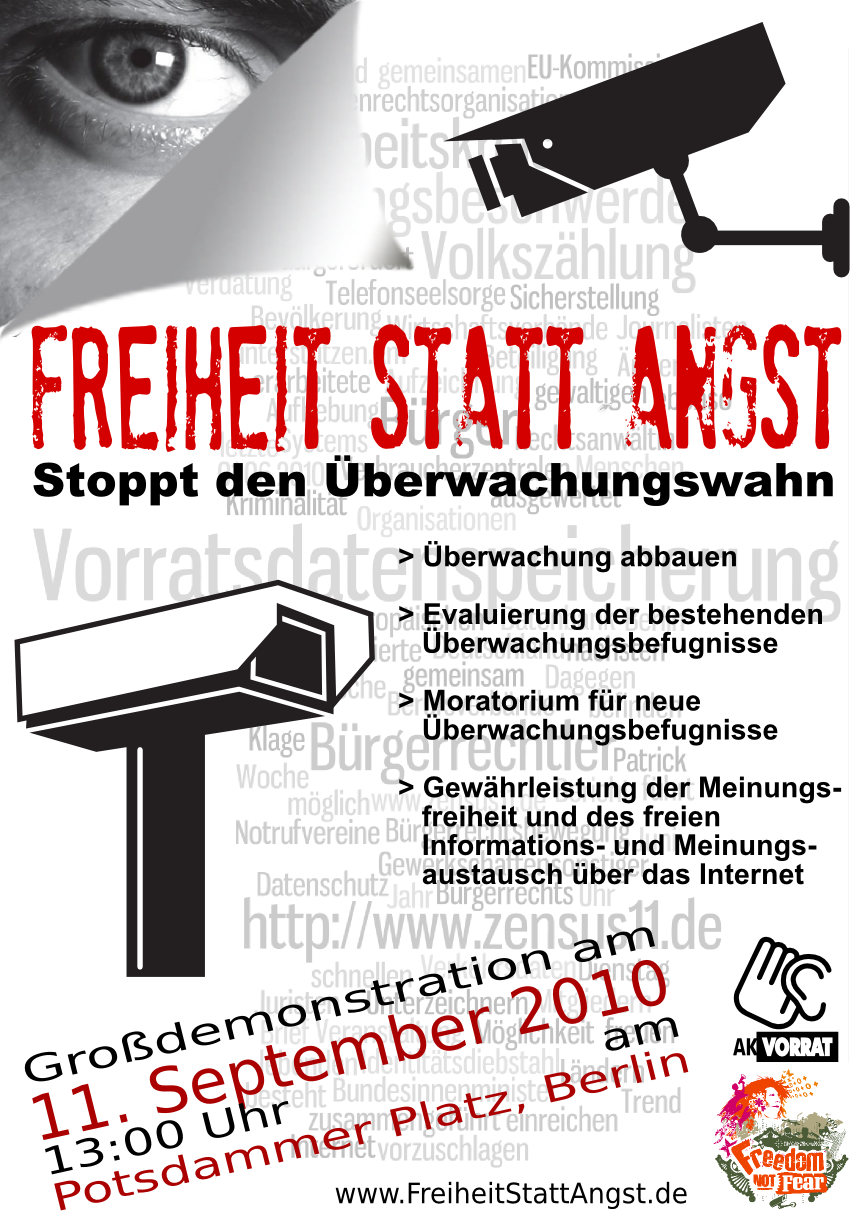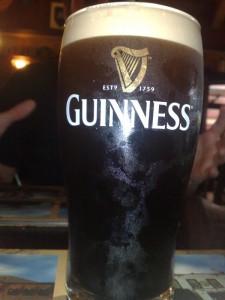I had the opportunity to attend the 18th DFN Workshop (I wonder how that link will look like next year) and since it’s a great event I don’t want you to miss out. Hence I’ll try to sum the talks and the happenings up.
It was the second year for the conference to take place in Hotel Grand Elysee in Hamburg, Germany. I was unable to attend last year, so I didn’t know the venue. But I am impressed. It is very spacious, friendly and well maintained. The technical equipment seems to be great and everything worked really well. I am not too sure whether this is the work of the Hotel or the Linux Magazin though.
After a welcome reception which provided a stock of caffeine that should last all day long, the first talk was given by Dirk Kollberg from Sophos. Actually his boss was supposed to give the talk but cancelled it on short notice so he had to jump in. He basically talked about Scareware and that it was a big business.
He claimed that it used to be cyber graffiti but nowadays it turned into cyber war and Stuxnet would be a good indicator for that. The newest trend, he said, was that a binary would not only be compressed or encrypted by a packer, but that the packer itself used special techniques like OpenGL functions. That was a problem for simulators which were commonly used in Antivirus products.
He investigated a big Ukrainian company (Innovative Marketing) that produced a lot of scareware and was in fact very well organised. But apparently not from a security point of view because he claimed to have retrieved a lot of information via unauthenticated HTTP. And I mean a lot. From the company’s employees address book, over ERM diagrams of internal databases to holiday pictures of the employees. Almost unbelievable. He also discovered a server that malware was distributed from and was able to retrieve the statistics page which showed how much traffic the page made and which clients with which IPs were connecting. He claimed to have periodically scraped the page to then compile a map with IPs per country. The animation was shown for about 90 scraped days. I was really wondering why he didn’t contact the ISP to shut that thing down. So I asked during Q&A and he answered that it would have been for Sophos because they wouldn’t have been able to gain more insight. That is obviously very selfish and instead of providing good to the whole Internet community, they only care about themselves.
The presentation style was a bit weird indeed. He showed and commented a pre-made video which lasted for 30 minutes out of his 50 minutes presentation time. I found that rather bold. What’s next? A pre-spoken video which he’ll just play while standing on the stage? Really sad. But the worst part was as he showed private photos of the guy of that Ukrainian company which he found by accident. I also told him that I found it disgusting that he pillared that guy in public and showed off his private life. The people in the audience applauded.
A coffee break made us calm down.
The second talk about Smart Grid was done by Klaus Mueller. Apparently Smart Grids are supposed to be the new big thing in urban power networks. It’s supposed to be a power *and* communications network and the household or every device in it would be able to communicate, i.e. to tell or adapt its power consumption.
He depicted several attack scenarios and drew multiple catastrophic scenarios, i.e. what happens if that Smart Grid system was remotely controllable (which it is by design) and also remotely exploitable so that you could turn off power supply for a home or a house?
The heart of the Smart Grid system seemed to be so called Smart Meters which would ultimately replace traditional, mechanical power consumption measuring devices. These Smart Meters would of course be designed to be remotely controllable because you will have an electrified car which you only want to be charged when the power is at its cheapest price, i.e. in the night. Hence, the power supplier would need to tell you when to turn the car charging, dish or clothes washing machine on.
Very scary if you ask me. And even worse: Apparently you can already get Smart Meters right now! For some weird reason, he didn’t look into them. I would have thought that if he was interested in that, he would buy such a device and open it. He didn’t even have a good excuse, i.e. no time or legal reasons. He gave a talk about attack scenarios on a system which is already partly deployed but without actually having a look at the rolled out thing. That’s funny…
The next guy talked about Smart Grids as well, but this time more from a privacy point of view. Although I was not really convinced. He proposed a scheme to anonymously submit power consumption data. Because the problem was that the Smart Meter submitted power consumption data *very* regularly, i.e. every 15 minutes and that the power supplier must not know exactly how much power was consumed in each and every interval. I follow and highly appreciate that. After all, you can tell exactly when somebody comes back home, turns the TV on, puts something in the fridge, makes food, turns the computer on and off and goes to bed. That kind of profiles are dangerous albeit very useful for the supplier. Anyway, he committed to submitting aggregated usage data to the supplier and pulled off self-made protocols instead of looking into the huge fundus of cryptographic protocols which were designed for anonymous or pseudonymous encryption. During Q&A I told him that I had the impression of the proposed protocols and the crypto being designed on a Sunday evening in front of the telly and whether he actually had a look at any well reviewed cryptographic protocols. He didn’t. Not at all. Instead he pulled some random protocols off his nose which he thought was sufficient. But of course it was not, which was clearly understood during the Q&A. How can you submit a talk about privacy and propose a protocol without actually looking at existing crypto protocols beforehand?! Weird dude.
The second last man talking to the crowd was a bit off, too. He had interesting ideas though and I think he was technically competent. But he first talked about home routers being able of getting hacked and becoming part of a botnet and then switched to PCs behind the router being able to become part of a botnet to then talk about installing an IDS on every home router which not only tells the ISP about potential intrusions but also is controllable by the ISP, i.e. “you look like you’re infected with a bot, let’s throttle your bandwidth”. I didn’t really get the connection between those topics.
But both ideas are a bit weird anyway: Firstly, your ISP will see the exact traffic it’s routing to you whatsoever. Hence there is no need to install an IDS on your home router because the ISP will have the information anyway. Plus their IDS will be much more reliable than some crap IDS that will be deployed on a crap Linux which will run on crappy hardware. Secondly, having an ISP which is able to control your home router to shape, shut down or otherwise influence your traffic is really off the wall. At least it is today. If he assumes the home router and the PCs behind it to be vulnerable, he can’t trust the home router to deliver proper IDS results anyway. Why would we want the ISP then to act upon that potentially malicious data coming from a potentially compromised home router? And well, at least in the paper he submitted he tried to do an authenticated boot (in userspace?!) so that no hacked firmware could be booted, but that would require the software in the firmware to be secure in first place, otherwise the brilliantly booted device would be hacked during runtime as per the first assumption.
But I was so confused about him talking about different things that the best question I could have asked would have been what he was talking about.
Finally somebody with practical experience talked and he presented us how they at Leibniz Rechenzentrum. Stefan Metzger showed us their formal steps and how they were implemented. At the heart of their system was OSSIM which aggregated several IDSs and provided a neat interface to search and filter. It wasn’t all too interesting though, mainly because he talked very sleepily.
The day ended with a lot of food, beer and interesting conversations 🙂
The next day started with Joerg Voelker talking about iPhone security. Being interested in mobile security myself, I really looked forward to that talk. However, I was really disappointed. He showed what more or less cool stuff he could do with his phone, i.e. setting an alarm or reading email… Since it was so cool, everybody had it. Also, he told us what important data was on such a phone. After he built his motivation, which lasted very long and showed many pictures of supposed to be cool applications, he showed us which security features the iPhone allegedly had, i.e. Code Signing, Hardware and File encryption or a Sandbox for the processes. He read the list without indicating any problems with those technologies, but he eventually said that pretty much everything was broken. It appears that you can jailbreak the thing to make it run unsigned binaries, get a dump of the disk with dd without having to provide the encryption key or other methods that render the protection mechanisms useless. But he suffered a massive cognitive dissonance because he kept praising the iPhone and how cool it was.
When he mentioned the sandbox, I got suspicious, because I’ve never heard of such a thing on the iPhone. So I asked him whether he could provide details on that. But he couldn’t. I appears that it’s a policy thing and that your application can very well read and write data out of the directory it is supposed to. Apple just rejects applications when they see it accessing files it shouldn’t.
Also I asked him which protection mechanisms on the iPhone that were shipped by Apple do actually work. He claimed that with the exception of the File encryption, none was working. I told him that the File encryption is proprietary code and that it appears to be a designed User Experience that the user does not need to provide a password for syncing files, hence a master key would decrypt files while syncing.
That leaves me with the impression that an enthusiastic Apple fanboy needed to justify his iPhone usage (hey, it’s cool) without actually having had a deeper look at how stuff works.
A refreshing talk was given by Liebchen on Physical Security. He presented ways and methods to get into buildings using very simple tools. He is part of the Redteam Pentesting team and apparently was ordered to break into buildings in order to get hold of machines, data or the network. He told funny stories about how they broke in. Their tools included a “Keilformgleiter“, “Tuerfallennadeln” or “Tuerklinkenangel“.
Once you’re in you might encounter glass offices which have the advantage that, since passwords are commonly written on PostIts and sticked to the monitor, you can snoop the passwords by using a big lens!
Peter Sakal presented a so called “Rapid in-Depth Security Framework” which he developed (or so). He introduced to secure software development and what steps to take in order to have a reasonably secure product. But all of that was very high level and wasn’t really useful in real life. I think his main point was that he classified around 300 fuzzers and if you needed one, you could call him and ask him. I expected way more, because he teased us with a framework and introduced into the whole fuzzing thing, but didn’t actually deliver any framework. I really wonder how the term “framework” even made it into the title of his talk. Poor guy. He also presented softscheck.com on every slide which now makes a good entry in my AdBlock list…
Fortunately, Chritoph Wegener was a good speaker. He talked about “Cloud Security 2.0” and started off with an introduction about Cloud Computing. He claimed that several different types exist, i.e. “Infrastructure as a Service” (IaaS), i.e. EC2 or Dropbox, “Platform as a Service” (PaaS), i.e. AppEngine or “Software as a Service (SaaS), i.e. GMail or Twitter. He drew several attack scenarios and kept claiming that you needed to trust the provider if you wanted to do serious stuff. Hence, that was the unspoken conclusion, you must not use Cloud Services.
Lastly, Sven Gabriel gave a presentation about Grid Security. Apparently, he supervises boatloads of nodes in a grid and showed how he and his team manage to do so. Since I don’t operate 200k nodes myself, I didn’t think it was relevant albeit it was interesting.
To conclude the DFN Workshop: It’s a nice conference with a lot of nice people but it needs to improve content wise.







